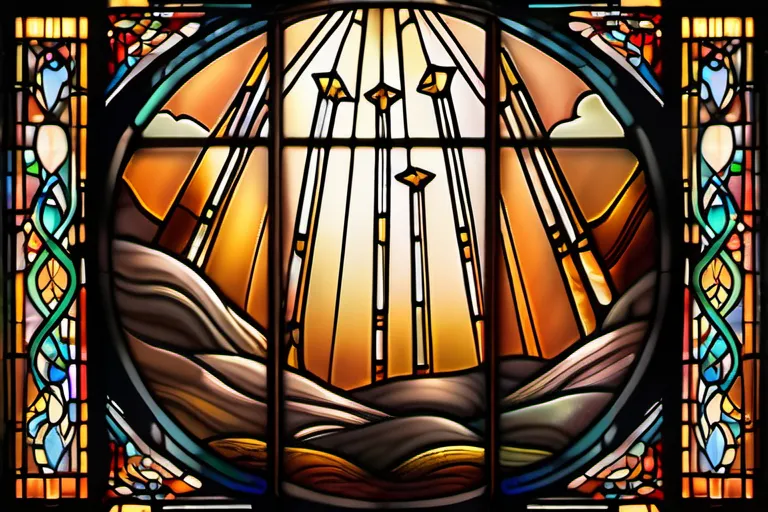Explore the concept of Purgatory, its purpose, and its role in Catholicism.
Purgatory is a unique and fascinating aspect of Catholicism. This article delves into the concept of Purgatory, its origins, its purpose, and its significance within the faith. Join us as we explore this intriguing topic.
The Concept of Purgatory
The concept of Purgatory has been a source of fascination and speculation for centuries, much like a mystery hidden within another mystery. In Catholicism, Purgatory is often described as a place where souls undergo purification to remove temporal sins before entering eternal bliss. But what exactly does that mean? Could it be likened to a purifying oven, baking away the imperfections of our earthly existence?
The origins of this concept date back to early Christian teachings. Initially, there was no explicit doctrine on Purgatory in the New Testament or in the writings of the Church Fathers who were closer to the apostolic era. However, as the Church grew and evolved, so did its understanding and interpretation of salvation and the afterlife. Could it be that over time, the concept of Purgatory emerged as a necessary bridge between the physical world we live in and the eternal realm beyond?
One way to think about Purgatory is through the metaphor of a river. Just like how a river needs to cleanse itself to flow smoothly, our souls need purification before they can seamlessly join with God. In this view, Purgatory serves as a temporary state where souls are purified, much like water filtering through sand and rocks to become clearer.
This idea is further reinforced by the concept of ‘moral cleansing’. In Catholic theology, Purgatory is not just about removing physical sins but also about making amends for any moral shortcomings. It’s a place where souls can make reparations for the wrongs committed during their earthly lives, much like how we might apologize and seek forgiveness before fully mending a broken relationship.
Purgatory’s Role in the Afterlife
So, what exactly does Purgatory mean in Catholicism? It’s a term that often sparks curiosity and perhaps even some confusion among believers and non-believers alike. Imagine Purgatory as a spiritual crossroads, where souls are given one last chance to cleanse themselves before they can enter the eternal peace of Heaven. In Catholic teachings, this place serves a crucial purpose—it’s a liminal space between earthly life and final rest in God’s embrace.
Why is Purgatory so important? It acts as a bridge, not just physically but spiritually. Souls that have lived virtuous lives but may still carry some imperfections or sins are deemed worthy of purification here. The idea is that even the holiest souls can find themselves with lingering attachments to earthly things, and Purgatory offers them a final opportunity for redemption.
Consider it like a thorough cleaning process after a long, messy renovation. Just as you might scrub your kitchen tiles one last time before moving in, souls undergo a similar purification in Purgatory. It’s not about punishing the soul but rather ensuring its total holiness and readiness to see God face-to-face.
Think of it also as a form of grace. In this sense, Purgatory isn’t just about what we do or don’t deserve; it’s about divine mercy and the infinite love of God who wants every soul to be perfect in His sight. It’s a place where souls can continue to grow spiritually, learning from their experiences and making amends for past mistakes.
So, as we delve deeper into the concept of Purgatory, remember that it is not just about punishment but about purification and preparation. This understanding helps us appreciate its role in Catholic theology, offering comfort and hope to those who are grieving or seeking assurance for their loved ones.
The Soul’s Journey through Purgatory
Imagine a journey, much like climbing a mountain peak after a storm has cleared. The path isn’t just about reaching the summit; it’s also about clearing away the remnants of the storm—leaves, debris, and even some mud that clings to your boots. In Catholicism, this metaphorical climb is akin to the process of purification through Purgatory.
Once a soul has passed beyond death, it enters Purgatory, a place where souls are refined and purified before they can enter Heaven in its full glory. The concept of purgation isn’t about punishment but rather about the soul’s journey towards perfection, much like how a sculptor works to refine a piece of stone into its finest form.
Consider the flame that burns away impurities; just as a fire transforms coal into glowing embers, so too does Purgatory burn away the imperfections left from earthly life. This purification is not an easy task, but rather a process of transformation, where each soul faces their own unique challenges and trials to purge themselves of any remaining stains.
How do souls navigate this path? Through prayer, repentance, and the merits of the saints who intercede on their behalf. Just as a gardener tends to a garden, ensuring that it flourishes with care and attention, so too does the Church pray for the souls in Purgatory, offering their prayers as an act of love and support.
As we journey through this concept, remember that every step taken is part of a broader tapestry of faith and hope. It’s not about being judged or condemned but rather about finding the light within oneself to shine brightly in eternity. This process isn’t just for the departed; it also reminds us, the living, of our own responsibilities towards purification and spiritual growth.
So, as we explore further into the intricacies of Purgatory, let’s not forget that each soul’s journey is unique, much like a fingerprint—distinct yet part of something greater. In this process, we find solace in knowing that even beyond death, there is still the possibility for transformation and redemption.
Purgatorial Prayers and Practices
Now that we’ve explored the soul’s journey through Purgatory, let’s delve into the prayers and practices associated with this spiritual realm in Catholicism. Imagine walking a path lined with candles, each one representing a prayer for a loved one’s purification. These candles flicker in the dim light of faith, illuminating the darkness of uncertainty. But why do Catholics engage in these practices? Isn’t Purgatory a place where souls are purified by fire, as it were?
Prayers and Practices
- Bonae Membra Offertory Prayers: These prayers, offered during the Mass, ask for the forgiveness of sins committed in this life. They symbolize the idea that even after death, we can seek cleansing through spiritual acts.
- Prayers for the Dead: Catholics often recite these prayers at funerals or on All Souls’ Day to assist souls in their purgatorial journey. These prayers are a form of charity, a way to show love and support from beyond the grave.
- Hail Mary Prayers: This simple but powerful prayer is often said repeatedly for deceased loved ones. It’s as if each ‘Ave Maria’ serves like a feather gently touching the souls in purgatory, providing comfort and hope.
- Acts of Reparation: These are specific actions or prayers intended to make up for sins committed by others. They can be seen as a form of spiritual penance, helping to alleviate the suffering of those still being purified.
These practices are not just ritualistic; they serve as a bridge between the living and the purgatorial souls. Through them, we acknowledge that our actions have consequences even after death, and that we can play an active role in the purification process. It’s like planting seeds of grace—small acts that may grow into the roots of a soul’s salvation.
So, why are these practices so important? They remind us of the interconnectedness of life and death, of how our choices continue to impact others even beyond this earthly existence. By engaging in these prayers and practices, we can offer hope and light to souls in purgatory, helping them on their path towards eternal peace.
The Impact of Purgatory on Catholic Beliefs
How has the belief in Purgatory seeped into every corner of Catholic life, shaping not just what people believe but how they live their daily routines? Imagine Purgatory as a vast, shimmering lake, where souls must cleanse themselves before entering the pure light of Heaven. This image helps us understand the profound impact it has on Catholic beliefs and practices.
One of the most significant influences is in the concept of indulgences. The Church teaches that indulgences can help reduce one’s time in Purgatory, effectively shortening their spiritual cleansing period. This belief encourages Catholics to engage in penitential acts, such as prayer and almsgiving, not just for themselves but also for the souls of loved ones who have passed away. It’s almost like a form of spiritual insurance, where good works can pave the way to heaven.
Moreover, the notion of Purgatory has led to a deeper appreciation of the sacraments, especially the Eucharist and Reconciliation. Catholics are encouraged to receive Communion frequently and confession regularly, seeing these practices as vital steps in their journey towards holiness. It’s like walking through a narrow path lined with thorns; each step is painful but necessary for growth.
The belief also influences funerary rites. Many Catholic families hold vigils for the dead, reciting prayers such as the Misereor or the Eternal Rest. These practices are seen as acts of charity and intercession on behalf of the deceased, helping them through their purification process. It’s almost like extending a hand to someone struggling in the water, hoping they can reach the shore.
Ultimately, Purgatory has become a cornerstone of Catholic spirituality, influencing everything from personal devotion to communal practices. By understanding and embracing this concept, Catholics find solace in knowing that every step taken on their spiritual journey matters, whether it’s through prayer, charity, or the sacraments.
Controversies and Debates Surrounding Purgatory
When discussing controversies surrounding Purgatory, one cannot help but wonder how this concept has managed to hold such a significant place in Catholic theology despite centuries of scholarly debate and skepticism from other religious traditions. Some see Purgatory as a necessary step on the path to salvation, while others argue it is an outdated notion that lacks biblical support.
Consider the metaphorical journey through life: Just as a traveler might face trials and tribulations en route to their destination, Catholics believe individuals must undergo purification before reaching eternal happiness. The question then arises: Why would God require such a process if He already knows our true worth?
Supporters of Purgatory argue that it serves as a place where souls can be refined and purified, much like refining gold in a forge. They contend that the concept ensures no soul is perfect before entering Heaven, ensuring that all are prepared for eternal life with God.
However, critics challenge this view by pointing out that the Bible does not explicitly mention Purgatory. Some argue it introduces an unnecessary layer of complexity to the path to salvation and could potentially create divisions within the Church. They question whether such a concept is needed when faith and good works are sufficient for eternal life.
The debate over Purgatory has also stirred theological discussions about predestination and free will, raising profound questions about human responsibility in achieving salvation. This has led many to ponder: Is our fate predetermined, or do we have the power to influence it through our actions?
Regardless of one’s stance on this issue, the controversy surrounding Purgatory highlights the dynamic nature of religious beliefs and practices. It challenges us to reflect on what truly matters in our spiritual journey – is it purgation or perfection that defines our path towards God?
In the end, the debates over Purgatory serve as a reminder of the rich tapestry of Catholic doctrine and the ongoing dialogue within its traditions.
Conclusion
 In conclusion, understanding Purgatory provides valuable insights into the beliefs and practices of Catholicism. By appreciating its role in the afterlife, we can gain a deeper understanding of the faith and its teachings.
In conclusion, understanding Purgatory provides valuable insights into the beliefs and practices of Catholicism. By appreciating its role in the afterlife, we can gain a deeper understanding of the faith and its teachings.











